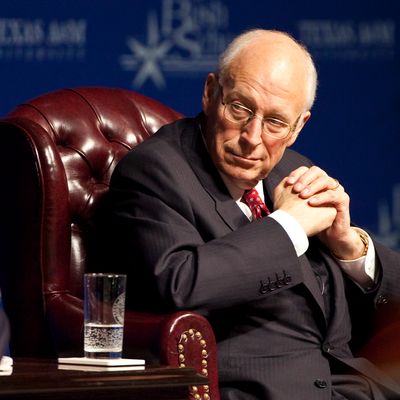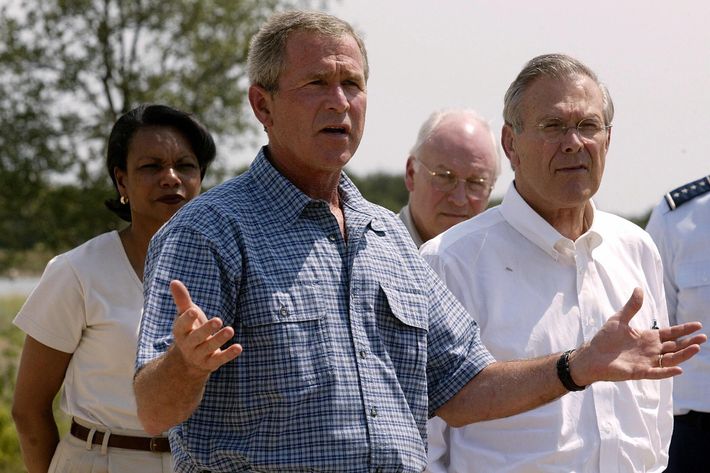
Dick Cheney has spent years insisting that the United States government does not torture people. Last week, the Senate Intelligence Committee released a report falsifying this claim in exhaustive detail, rendering his denial as implausible as believing that, oh, the release of heat-trapping gasses into the atmosphere does not cause the atmosphere to trap more heat. But it is possible to deny anything, and conservative-movement dogma has forced its adherents to deny a great many things.
On Sunday, Cheney appeared on NBC’s Meet the Press, where a well-informed Chuck Todd pressed him repeatedly with details from the report. Cheney’s answer furnished what will surely become the template for his party’s new torture denial. The argument incorporates six basic elements.
1. Torture by definition is done to Americans, not by them. Cheney’s most frequent response was to define torture as things done by regimes hostile to the United States. Since the United States government is not hostile to the United States, the U.S. does not torture:
Well, torture, to me, Chuck, is an American citizen on a cell phone making a last call to his four young daughters shortly before he burns to death in the upper levels of the Trade Center in New York City on 9/11. …
I’ve told you what meets the definition of torture. It’s what 19 guys armed with airline tickets and box cutters did to 3,000 Americans on 9/11.
This used to be called “terrorism.”
Todd attempted to probe this definition by asking Cheney if the specific forms of torture Cheney has explicitly endorsed would be torture if other countries did them to our captured soldiers. Cheney refused to consider them.
CHUCK TODD:
So if an American citizen is waterboarded by ISIS are we going to try to prosecute for war crimes?
DICK CHENEY:
He’s not likely to be waterboarded, he’s likely to have his head cut off. It’s not a close call. …
CHUCK TODD:
If another country captures a U.S. soldier, the Iranian regime, water boards–
DICK CHENEY:
Chuck, he–
(OVERTALK)
CHUCK TODD:
–is that going to be an accepted–
DICK CHENEY:
–you’re trying to come up now with hypothetical situations.
Of course, a hypothetical scenario can usefully test an argument. Cheney invokes hypothetical situations all the time in order to endorse torture (i.e., a nuclear weapon smuggled into New York City). He won’t consider this hypothetical because it destroys his argument.
2. Torture is either legal or extra-legal. Cheney created a second logical paradox. Any form of torture carried out by American officials was vetted by his administration’s lawyers, and is therefore not torture, since torture is illegal:
Definitions, and one that was provided by the Office of Legal Counsel, we went specifically to them because we did not want to cross that line into where we violating some international agreement that we’d signed up to. They specifically authorized and okayed, for example, exactly what we did. All of the techniques that were authorized by the president were, in effect, blessed by the Justice Department opinion that we could go forward with those without, in fact, committing torture. …
We did what was, in fact, required to make certain that going forward we were not violating the law. And the law, as interpreted by the Justice Department, the Office of Legal Counsel was very clear.
So, there was a program. The program is legal, because lawyers approved it. Now Cheney concedes that some forms of torture occurred outside of the “program,” but because they’re outside the program, they don’t count:
DICK CHENEY:
–that does not meet the definition of what was used in the program as …
If you go and look, for example, at Jose Rodriguez book, and he was the guy running the program, he’s got a very clear description of how, in fact, the program operated. With respect to that I think the agency has answered it and its response to the committee report and I–
CHUCK TODD:
–but you acknowledge this was over and above.
DICK CHENEY:
–that was not something that was done as part of the interrogation program.
CHUCK TODD:
But you won’t call it torture.
DICK CHENEY:
It wasn’t torture in terms of it wasn’t part of the program – just some rogue agents acting on their own in ways that the administration can’t be held accountable.
Officially sanctioned forms of torture are not torture because they’re officially sanctioned. Unsanctioned forms of torture are not torture because they’re not sanctioned.

3. Simple factual obfuscation. In addition to complex logic games, Cheney also relies on the blunt technique of simply lying about the facts at hand. Todd described the case of Majid Khan, who was forced to endure rectal feeding and hydration. Cheney replied, “I believe it was done for medical reasons.”
In fact, the report describes rectal feeding as a form of behavior control, with no documented medical justification.
4. The report is partisan. “Now the Senate committee partisan operation, no Republicans involved, no interviews of anybody involved itself,” explained Cheney. It is true that Republicans on the committee boycotted the torture report. They had no incentive to lend their imprimatur to a report that would disprove an important premise of their own party’s doctrine. If they had participated, the report would be described as “bipartisan”; their non-participation creates a helpful talking point against it.
Is it true that the non-participation of Republicans nullifies the report’s conclusions? It might if the report had attempted to establish a negative. Suppose a committee were investigating allegations that, say, the Obama administration abused the IRS for political purposes. A report finding no such abuse carried out only by Democrats might be suspicious — if Republicans had joined in the report, they may have found evidence that Democrats overlooked. But the partisan report found clear evidence of torture. Unless that evidence has been fabricated from thin air, how would the participation of Republicans have nullified it?
5. Torture is actually defined as “extreme torture.” This is less an argument than a new term designed to shift the boundaries of the debate. Here is Cheney contraposing American torture to what he calls “extreme torture”:
In terms of torture I guess what I do, I was struck, for example, by the statements by Bud Day and Leo Thorsness and Admiral Denton. These are three folks who were captured by the North Vietnamese, held for a year, subject to extreme torture. And all of whom said that waterboarding was not torture.
This is a kind of fallback defense — we may have shackled men to the ceiling in diapers, locked them in coffin-size boxes for days, and even killed them, but we did not engage in “extreme torture.”
6. Nothing is torture if it prevents an attack. Todd pressed Cheney with evidence that one quarter of the victims of American torture were not hardened terrorists at all but victims of bad tips or mistaken identity.
Where are you going to draw the line, Chuck? How are – …
I’m more concerned with bad guys who got out and released than I am with a few that, in fact, were innocent….
I have no problem as long as we achieve our objective. And our objective is to get the guys who did 9/11
Fundamentally nothing the United States did constitutes torture as long as it prevents a terrorist attack. This justification can be proven with one of two possible scenarios. One is the absence of a major terrorist attack, which Cheney holds up as proof of torture’s effectiveness:
the techniques that we did, in fact, use that the president authorized that produced results, that gave us the information we needed to be able to safeguard the nation against further attacks
The second is the danger of a terrorist attack, which Cheney holds up as proof that torture is needed:
We’re still at war. The terrorists that are out there today is as bad as it was on 9/11. We’ve got ISIS talking about attacking the United States, having created a caliphate. We’re in a situation at least as bad as we had on 9/11 when after the attack we had word that Al Qaeda was trying to acquire nuclear weapons.
Torture is either successful or necessary. And it always will be, and it will never be torture, and it will always be either legal or unsanctioned.






























